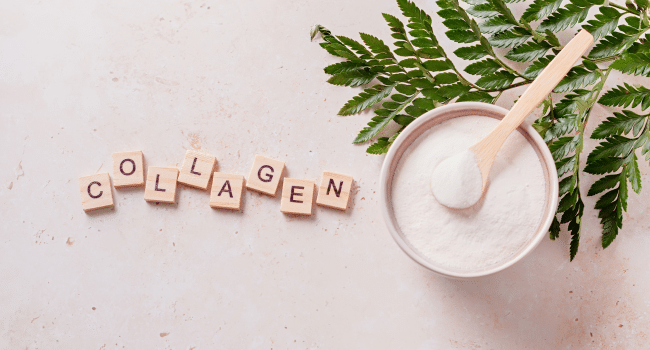Table of Contents
Introduction
Collagen powder has quickly become a staple in the wellness and beauty industry. From boosting skin elasticity to improving joint health, it’s used by people of all ages to support a healthier lifestyle. But like any other consumable product, collagen powder has a shelf life. Whether you’ve found a forgotten tub at the back of your cabinet or want to ensure your current supply stays effective, understanding the expiration of collagen powder is essential.
In this comprehensive guide, we’ll explore everything from shelf stability, signs of expiration, storage practices, effects of consuming expired collagen, and tips to extend its usability.
Understanding Collagen Powder
What is Collagen?
Collagen is the most abundant protein in the human body, forming the structure for skin, bones, tendons, and ligaments. Collagen supplements are often derived from bovine (cow), marine (fish), or porcine (pig) sources. The powder form is hydrolyzed collagen, or collagen peptides, which is easier to digest and absorb.
Forms of Collagen Supplements
- Collagen peptides (powdered form)
- Capsules or tablets
- Gummies
- Liquid collagen
- Topical forms (less effective internally)
Why Collagen Powder?
- Highly bioavailable
- Easily mixed with drinks or foods
- Neutral flavor
- Versatile for daily use
Does Collagen Powder Expire?
Short Answer: Yes, it does.
While collagen powder is a shelf-stable product, it isn’t immune to expiration. The good news is that it typically has a long shelf life—usually 1.5 to 3 years from the manufacturing date.
Where to Find the Expiration Date
- Printed on the bottom of the container
- On the label near the supplement facts
- Often listed as “Best By” or “Use By”
Factors Affecting Shelf Life
- Packaging: Air-tight containers extend longevity
- Storage conditions: Heat, light, and moisture can degrade proteins
- Additives: Natural flavors or other ingredients may reduce shelf life
- Manufacturing method: High-quality hydrolysis results in longer shelf life
Signs Your Collagen Powder Has Gone Bad
Even before the expiration date, collagen powder may spoil if stored improperly. Watch for:
1. Unpleasant Odor
Fresh collagen powder is nearly odorless or has a slight natural scent. A strong, sour, or musty smell is a warning sign.
2. Discoloration
Normal collagen powder is white or off-white. If it turns yellow, gray, or spotty, it could be contaminated.
3. Texture Changes
Clumping or a moist texture indicates moisture exposure, which may lead to mold growth.
4. Taste Differences
Collagen is usually neutral in taste. A bitter or off-putting taste means it’s likely degraded.
5. Mold or Particulate Growth
Obvious signs like mold growth, discoloration patches, or separation mean it’s no longer safe.
Can You Use Expired Collagen Powder?
Is it dangerous?
Consuming slightly expired collagen that was stored correctly might not cause harm, but it’s less effective. The protein can degrade, and potency declines.
Risks Include:
- Gastrointestinal discomfort
- Weakened immune support
- Diminished skin or joint benefits
- Higher risk of contamination
Rule of Thumb
If you’re unsure, it’s safer to discard and replace. Don’t take chances with supplements.
How to Store Collagen Powder Properly
To maximize shelf life and potency:
1. Keep It Cool and Dry
Store it in a cabinet away from heat and humidity—avoid kitchens and bathrooms.
2. Seal Tightly After Each Use
Use containers with moisture-absorbing packets. Always seal lids immediately.
3. Use Original Packaging
Unless it’s damaged, keep it in its original air-tight container.
4. Avoid Cross-Contamination
Use dry, clean spoons. Moisture or food particles accelerate spoilage.
5. Avoid Freezing
Though it may seem like a good idea, freezing collagen can introduce condensation upon thawing.
What Affects the Quality Over Time?
Even if a product hasn’t expired, its effectiveness may degrade. Consider:
- Heat exposure – destroys peptides
- Oxygen exposure – leads to oxidation
- UV light – breaks down proteins
- Repeated opening/closing – increases air exposure
These environmental factors silently wear down the supplement quality over time.
Collagen Powder vs. Other Supplement Forms
Shelf Life Comparison
| Supplement Type | Shelf Life (Avg.) | Susceptibility to Spoilage |
| Collagen powder | 2-3 years | Moderate |
| Capsules/tablets | 1-2 years | Low |
| Gummies | 1 year | High (sugar-based) |
| Liquid collagen | 6-12 months | High |
Manufacturer Differences
Quality varies by brand. Look for:
- Third-party testing – ensures purity and safety
- Certificates of Analysis (CoA) – confirms what’s on the label is in the container
- Brands with transparent expiration labeling
- Minimal ingredients – fewer additives mean longer shelf life
Common Questions
Can I refrigerate collagen powder?
Not necessary and may cause clumping due to moisture condensation.
Can expired collagen make you sick?
If spoiled, yes. If only mildly expired and stored well, it’s usually just ineffective.
Can I bake or cook with expiring collagen?
Yes, but heat may further degrade the protein.
Final Thoughts
Like any supplement, collagen powder has a lifespan. Proper storage can help extend that window, but once it shows signs of spoilage—or passes its best-by date by too long—it’s wise to replace it. With so many affordable and high-quality collagen options available today, it’s not worth risking your health or wasting time on a product that no longer works.
Always prioritize freshness when it comes to supplements meant to support your body. It’s an investment in your well-being.
